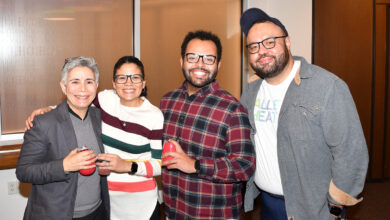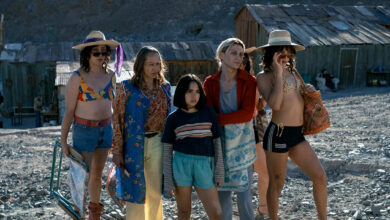Exploring Rural Gay Identity: Author David Meischen’s Journey
Author David Meischen explores small-town Texas memories in two new collections.

If you’ve grown up rural and gay, certain things stay with you long after you’ve left that home—not all of them tangible. These are the memories that animate two new books by David Meischen—the short stories collection Nopalito, Texas (University of New Mexico Press) and Caliche Road Poems (Lamar University Press). Meischen will be signing and reading from both books at Blue Willow Bookstore this month.
Fictional Town
Meischen grew up on a remote south Texas farm in the 1950s and 1960s, about 45 miles inland from Corpus Christi Bay. He went to high school in Orange Grove, a town that still has fewer than 1,500 people today. In 1969, he moved to Austin to study at the University of Texas, after which he spent 27 years teaching high-school English in Galveston; Elk Grove, California; and back in Austin for the last 12 years of his career.
From the time he was about 10 years old, he pictured himself a fiction writer. His long detour in poetry began as he was teaching high schoolers about poetry by giving them poetry prompts and practicing along with them. He started submitting his poems for publication, and in 1992, one was accepted by the Houston Poetry Fest. “Well, maybe I’m a poet then,” he told himself.
The lure of fiction continued to attract him, though, and in his mid-50s, Meischen enrolled in the creative-writing MFA program at Texas State University. It was there that his stories set in the fictional town of Nopalito had their start. The stories are linked by the shared locations and characters, and they span a time period from 1955 to 1998. He doesn’t call the collection “gay themed,” but there are three gay characters that appear throughout the stories.
One such character is Albert, who pronounces his name Al-bear, as if it were French. Albert is loosely based on someone Meischen knew in Orange Grove who worked in a liquor store. Albert speaks in an affected soft voice, dyes his hair black as he ages, and wears clear fingernail polish. In Meischen’s fiction, this character becomes a lonely caretaker of his mother and occasionally escapes to San Antonio for sexual encounters.
“I didn’t want Albert’s life to come across as utterly depressing, but I felt like I knew how claustrophobic…” Meischen pauses for the right words. “People in a small town would take one look at him, and even if they didn’t use words like ‘gay,’ they would be awkward. They wouldn’t know what to do with him.”
Meischen recalls seeing the 50th-anniversary Broadway revival of The Boys in the Band with a friend and another gay man he did not know, who said something denigrating about the play and how its characters were depicted as sad pre-Stonewall gay stereotypes. Meishcen didn’t want to get into an argument with the friend of a friend, but internally he was boiling. “I wanted to say to him, ‘You are standing on their shoulders. They made your life possible. Yes, there’s back-biting, yes, there are games, but those men in The Boys in the Band would have been born in the ‘30s. They are making a life for themselves.” To further his point, Meischen adds, “And people don’t walk out of Who’s Afraid of Virginia Woolf? saying, ‘Oh, those straight couples, they’re so mean to each other!’ There’s a lot of similarities between The Boys in the Band and George and Martha—the games, and the meanness.”
And while Meischen’s Nopalito, Texas characters are treated sympathetically, the harshness of the rural mid 20th-century setting is also treated realistically. Being gay was not easy.
At the same time, Meischen is quick to say Nopalito isn’t a direct analog of Orange Grove. In a brief author’s note at the front of the book, Meischen notes, “Nopalito is a fictional town, but I can tell you where it is.” He placed the town on the map near Orange Grove at an intersection on Highway 281, about 100 miles south of San Antonio. “I know where the county road goes across it. It’s about five miles from the farm where I grew up, so the place is familiar to me,” he says. “I didn’t want to borrow the town whole cloth, but I know that part of the world.”

Real Life
“My poems grow out of the same part of Texas that the short stories do,” Meischen says as we turned to Caliche Road Poems, “except the poems are based on the actual places—the actual Meischen farm, the actual caliche drive that goes from the farm to the highway. So my parents are in the poems; my great-grandfather, who I remember well, is in the poems. The dance hall in town is in the poems.”
Meischen didn’t come out until his early 40s. He had been married to a woman for 16 years and had two sons, but when they separated, he started asking himself if he was gay. “I think I clearly knew the answer, but I was still trying to be skeptical,” he says.
Thirty years later, he feels his coming out is core to his identity. He had grown angry with himself for “dithering and denying” who he was for so long. That explains why he came out to his parents in 1994. “It’s the hardest thing I’ve ever done,” he recalls, “but it seemed essential to me. I thought if I was going to have a life, these people had to know.” So one day he told the high school office where he worked to get a substitute for him, and he drove down to the Meischen farm. It did not go especially well, but they didn’t disown him. In fact, Meischen says, “My mother got up out of her chair, proclaimed herself flabbergasted in this very brusque voice, and she put her hand on my shoulder. She said, ‘But you’re our David.’ That was life-saving.”
As time passed, his mother settled more easily into the news. Two weeks before her passing from cancer, Meischen was visiting his parents. Mother and son waited until the father was off the farm, and then they sat and talked. “Just the two of us, she could talk to me about that news,” he said. “She died knowing who I was without screaming at me or disowning me.”
As for his father, Meischen illustrates their relationship post-coming out this way: “Daddy never set foot in the house that Scott and I owned in Austin for 18 years. My dad died right before we moved to New Mexico. He would not have Scott on the farm.” His father didn’t disown him, but there were limits to their conversations. “He didn’t want to know, he didn’t want me to talk about it, but he knew. To me, that was important.”
Meischen is referring to his husband, poet Scott Wiggerman. Together they run the small poetry publisher Dos Gatos Press. They’ve been together 27 years and married since 2013.
Reflecting on how both new books are so closely related, Meischen says. “I think part of it is my age. I’m in my 70s, and there is this nostalgia. There’s this really strong force of memory that takes me back to when I was growing up. The books feel like companion pieces.”
WHAT: Author David Meischen reading and book signing
WHEN: April 15, 6:00 p.m.
WHERE: Blue Willow Bookshop, 14532 Memorial Dr. at Dairy Ashford
INFO: bluewillowbookshop.com/event/meischen-24










